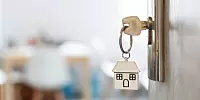-
France’s historic upturned boat houses offer clue to Dickens mystery
On France’s north coast lies a cluster of upside-down boats converted into dwellings. Could they explain a confusing quirk in the classic tale of David Copperfield?
-
Flat owner on hunger strike over non-paying tenants in south of France
‘I’m starting to feel a bit shaky’ says owner. The tenants say they cannot move out
-
French town is selling house for €1
However there are conditions and buyers will have to spend considerably more on renovations
Smart Homes enables innovation
Everyone has remote controls for the TV and hi-fi but today’s Smart Home has new versions that use the internet plus your smartphone, tablet, computer or even television to control other objects in your home and to do tasks automatically.

That means they can set heating controls in readiness for your return; reduce power consumption by switching off appliances that are not needed; set a robot vacuum cleaner in action; keep an eye out for burglars or even open doors for gîte guests to save leaving a key with a neighbour.
EDF has just launched a free application for its clients to check electricity consumption in anticipation of other options they are currently researching for what they call the 'smart home' of the future.
With the app e.quilibre you enter your meter reading on to your phone or tablet and you can then compare your consumption with similar homes, have an analysis of use in peak and off-peak times and work out the distribution of use by different appliances.
The energy giant also has 100 families in Lyon and Brittany testing other systems which send data from thermometers in each room to a box to show the way in which the heating affects consumption.
Tests are also being carried out to connect appliances so you can monitor them from a distance – for example, EDF says you will know if the children have left the fridge door open if they get home from school before you do.
François-Xavier Jeuland of the Fédération Française de Domotique, a group for consumers, manufacturers and installers of household automatic equipment, says there is something to suit everybody. “You can pay from €10 to €10,000 for systems which can do a whole range of jobs at a distance such as security, energy consumption, opening and shutting doors, controlling your cooker and telling you if your freezer has broken down.
“Little by little everything in the house will be able to be ‘connected’. It can be just a gadget, but it can also ease your comfort and lower household costs – and where it has a serious application is in helping disabled or elderly people who may be able to live in their homes for longer.”
Several companies have different types of systems available: from Honeywell with its range of heating and air conditioning systems up to Samsung with its integrated SmartThings system that links and controls its own electronic equipments such as ovens and vacuum cleaners with other internet-connected items in what is called the Internet of Things. These include Philips Hue lamps, August smart locks and Honeywell thermostats.
Internet connected objects already have so much information on their owners they can “sketch out” a typical day: your fitness monitor tells your smartphone how far you are on your daily run and it knows you will be home in 15 minutes – so it turns on the “clim” to cool you down, switches on the lights and gets the shower ready.
At present, Mr Jeuland says the most common purchases are for security systems which control alarms or show pictures of what is happening in your home via a webcam and smartphone or computer. These can easily be found in major DIY stores from just a few euros a month.
Around €250, he says, would buy a heating system which will alter the thermostat itself from weather reports it receives and there are systems which will “learn” the daily timetable of people in the home and will switch on the heating in anticipation of someone coming home.
“Another system which is very popular in the US and beginning to catch on here is for controlling the locks on your house.
“If you have a second home you rent out you can open the doors to welcome paying guests with your smartphone, even if you are several kilometres away.
“You won’t need a key and you won’t have to ask Madame down the road to let them in. You can also open up your own house at a set time a week, for example to let a cleaner in.”
Mr Jeuland says these petites domotiques give homeowners a taste of what a Smart Home can do for you. “It will take time but in the future they will be used more widely with solutions for all situations.”
























